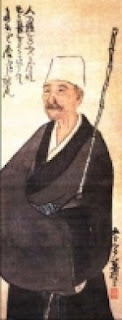
[Photo by awyn]
Continuing the theme of my
last post--the difficulty of translating poetry--here's an original poem written in words no longer commonly used, and a playful attempt to "translate" it. (I get to say it's a definitive translation 'cuz I'm both the author and the translator.)
I'm conducting this little exercise because I love working with words--and because it gives me new insights, both into poetry and into word meanings. I must include a disclaimer, however, that this in no way pretends to be good poetry. It does, however, communicate certain personal reflections gleaned from several mental journeys, walking amongst words stuffed in my head, lining my pocket, floating in the air--itching to just jump out, joggle the pencil perched in my ear, crying "Pick me! Say me! Let us out!"
Walking with WordsVicambulating through life
squiriferously, not like a foppotee,
I am a sparsile in a universe of vacivity.
Despite my pigritude, I emerge from my latibule.
Ever the inveteratist lover of serantique utterances,
I adimpleate on locupletative pleasantries.
Neither graviloquence, nor kexy tortiloquy this.
Historiasters will tudiculate me. I obstrigillate
their moriscant, cynicocratical obaceration to pessundate my blateration.
Hymnicides prevail:
theirs, mine.
But not our sodalitiousocity.
Translation:Strolling through life
graciously, not as a simpleton,
I am unknown in a universe of emptiness.
Despite my languidness, I've come out of my shell,
championing forgotten words.
I replenish myself with these enriching pleasantries.
Neither serious talk, nor stuffy elusiveness, this.
I shall resist the squawking word pickers!
Their caustic pricking, intended to silence me,
to obliterate my humble verse, will fail.
Words can be killed by tweaking, twisting, changing.
We are word people joined at the hip
watching the massacre,
or evolving, magnificent creations
that emerge.
So delicious!!
--Annie WyndhamOkay, calling my blaterations "hymns" may be going a bit far but it's not meant in the churchy sense. More like a
general song of ... joy. Or if not joy exactly, then appreciation. (For words, that they just
are.)
Notice I added words that were not in the original. Translators sometimes do this for clarification, although one must be careful not to overdue it. (As for reciting this poem out loud, forget it. I found I could barely READ it without cracking up laughing (or cursing, stumbling over the words. The word "torture" comes to mind, ha ha) .
Glossary of Word Meanings for words used in the "poem":
vicambulate = to walk about in the streets.
squiriferous = having the character or qualities of a gentleman.
foppotee = a simple-minded person.
sparsile = a star, not included in any constellation.
vacivity = emptiness.
pigritude = laziness.
latibule = hiding place.
inveteratist = one who resists reform, one who holds to tradition.
austerulous = slightly brutal.
serantique = very old or ancient.
adimpleate = to fill up.
locupletative = tending to enrich.
graviloquence = grave speech.
kexy = brittle,withered.
tortiloquy = dishonest or immoral speech.
historiaster = a contemptible historian.
tudiculate = to bruise or pound.
obstrigillate = to oppose, resist.
moriscant = producing the sensation of repeated biting or pricking.
Cynicocratical = pertaining to rule by cynics.
obaceration = the act of stopping one's mouth.
pessundate = to cast down or destroy.
blateration = (n.) act of blabbering, chattering.
hymnicide = killing of hymns through alterations.
sodalitious = belonging to society or fellowship. [Note: This is an adjective, but I made a noun out of it. Writers are allowed to make up new words.]
If you're wondering where I got these wonderful old words, go to
Save the Words, where you can "adopt" a word, to ensure it does not remain an orphan and gets a new life.
And for more word galleries, check out
Victorian Humor: Modern Meaning to Old Words. I especially liked the one for housewifery.
 Synchronicity: Found a poem by William and asked to put it on my website/ looked at William's website / Found a link to Silliman's Blog/ read Silliman's blog this morning / found a link to Save the Words/ it's the words' fault/ They simply can't contain themselves/no matter what/ Never have/ What is one to do?/.
Synchronicity: Found a poem by William and asked to put it on my website/ looked at William's website / Found a link to Silliman's Blog/ read Silliman's blog this morning / found a link to Save the Words/ it's the words' fault/ They simply can't contain themselves/no matter what/ Never have/ What is one to do?/.






